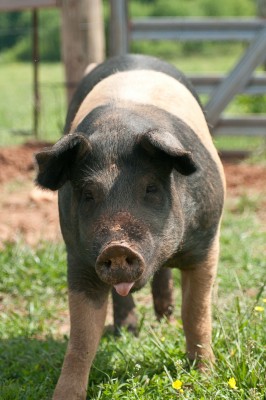African Swine Fever
Katelyn Walley, Business Management Specialist and Team Leader
Southwest New York Dairy, Livestock and Field Crops Program

African Swine Fever (ASF) is a viral disease that is rapidly spreading across Europe and Asia - with potential to affect the North American Swine Industry and have crippling economic impacts. While the disease does not spread to humans, is easily transmitted across hog populations, both wild and domestic.
The ASF virus can survive extreme temperatures for several months and many commonly used disinfectants, and causes high morbidity and mortality. At this time, the United States Department of Agriculture (USDA) does not allow imports of pigs or fresh pork products from affected regions. Symptoms of ASF include high fever, decreased appetite, weakness, skin blemishes, diarrhea, and respiratory illness. The disease is usually fatal, but if hogs do recover, they will continue to be carriers of the virus for several months. There is no vaccine or known treatment for ASF.
Proper biosecurity is the best prevention tool for swine producers. ASF can spread rapidly through direct pig contact, small insects (ticks, flies), contaminated feeds, materials and equipment, carcasses, and wild animals. Prevention can involve keeping pigs healthy and monitoring visitors (and their vehicles, equipment, supplies, etc.). Additionally, producers should not feed raw or undercooked pork products to pigs, and house pigs in an controlled environment when possible. If any pigs do become ill, isolate them and contact your veterinarian. When bringing in any new animals, isolate them for at least two to four weeks to monitor for illness. For more information, visit www.aphis.usda.gov.
Upcoming Events
WNY Pastureland Conversion & Soil Health Field Day
July 16, 2025
Middleport, NY
Join American Farmland Trust for the Western New York Soil Health Field Day on July 16, 2025, at Zeliff Farm in Middleport, NY, from 9:00 AM-3:15 PM. Learn about pasture conversion, soil health benchmarking, biochar in grazing systems, and best grazing practices. Plus, enjoy hands-on demos with the NY Soil Health Trailer, drones, and cover crops! Check out the attached agenda for more information about the field day and REGISTER HERE. Zeliff Farms is a regenerative beef operation who has recently partnered with AFT on outreach and education to farmers including learning circles and evaluating biochar effects on soil health.
IPM Strategies to Protect Corn and Soybean Seed in NY
July 30, 2025
Hamburg , NY
SWNYDLFC and Cornell IPM are hosting a grower meeting to discuss integrated pest management strategies for protecting corn and soybean seed in New York.
FAMACHA Training for Sheep and Goat producers in Woodhull NY
August 13, 2025 : FAMACHA Training in Woodhull
Woodhull, NY
Join us for a discussion and hands-on training for internal parasite integrated pest management in sheep and goats. Certification is available to all students participating in the workshop.
Announcements
No announcements at this time.





